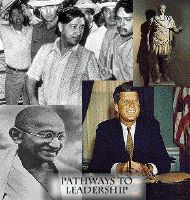
Starting point Voordaan
On the Dutch weblog by Daan (Voordaan) a start was made with a snowball interview. Her idea and execution has created a flood of loggers writing about themselves.
Other web logs and Volkskrantblog
I have chosen to use Volkskrantblog and Blogger to put down my ideas about leadership. My other thoughts and writings are saved at web-log en punt weblog. The reason to choose for one subject on a weblog, is something that other people might want to know. So lets start writing about the reason or reasons.
A few reasons
First there was a conference about leadership, that I started organizing. My Vk and Blogger weblog gave me the possibility to order and write down my own ideas about leadership.
My opinion about leadership is rather clear cut. I think that every human kan en should lead himself. That does not mean that I think that leading yourself is easy, but then neither is learning to walk.
Secondly I heard more and more people call out for leadership, but nobody really tells what is meant with leadership. I think, that as long as people are not able to lead themselves, they will receive leaders that will not do what is best for everybody.
I do not mean to say, that leadership is useless, but when an individual is not able to lead himself, he should certainly not ask others to lead him.
To me leadership means taking responsibility for ones actions. And to me that is not the same as being accountable. In the end one can only be accountable to oneself. It is off course possible to state, that one is accountable toward others, but maybe this simple question will make it clear what I mean.
Assume that some ones action are detrimental to others, but that he dies during that action.
- To whom will he be accountable?
- Is he accountable toward a higher being, that shaped everything?
Although humans like clarity about guilt and responsibility, we do not know why. Is it is something that is part of our nature or is it nurtured or maybe both.
My question about the responsibility of the leader could also be worded as following:
- Can a leader be held responsible for mistakes made by the cleaner, even if he did not personally see what happened?
Personally I do not think, that a leader can be personally responsible for the mistakes others make. He can be held accountable though, for how he handles the mistakes of others. Is he playing “pass the buck” or does he try to find a solution that fits the problems, that were created by the mistakes? In that last case I would call someone a real leader. His solution is not finding someone to blame, but to find a suitable solution.
Thirdly writing about leadership gives me a possibility to create a structured image of leadership. I mean a structure that answers questions like:
- What is leadership?
- How does one become a leader?
- What is that leaders do?
- What influences do leaders have?
- By what are leaders influences?
- How can leaders have influence?
To end
Writing about leadership makes it clearer and clearer, that leadership is the easiest thing to do. In the end it is bringing together all kinds of abilities we use daily. The difficulty lies in conquering our fear and taking our responsibility.



